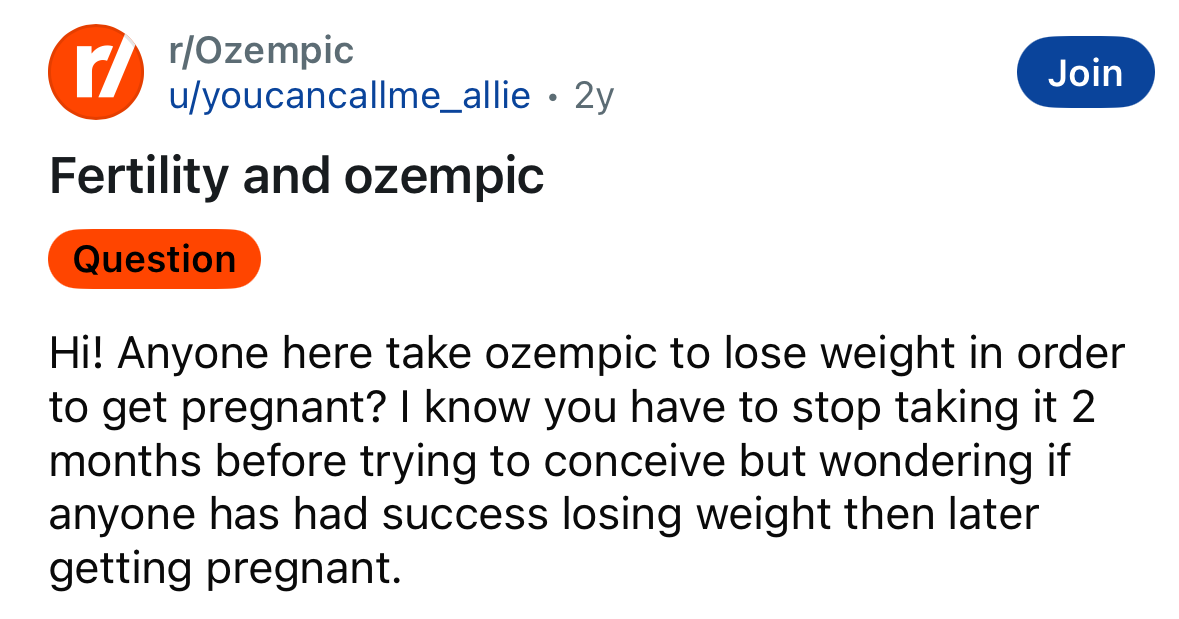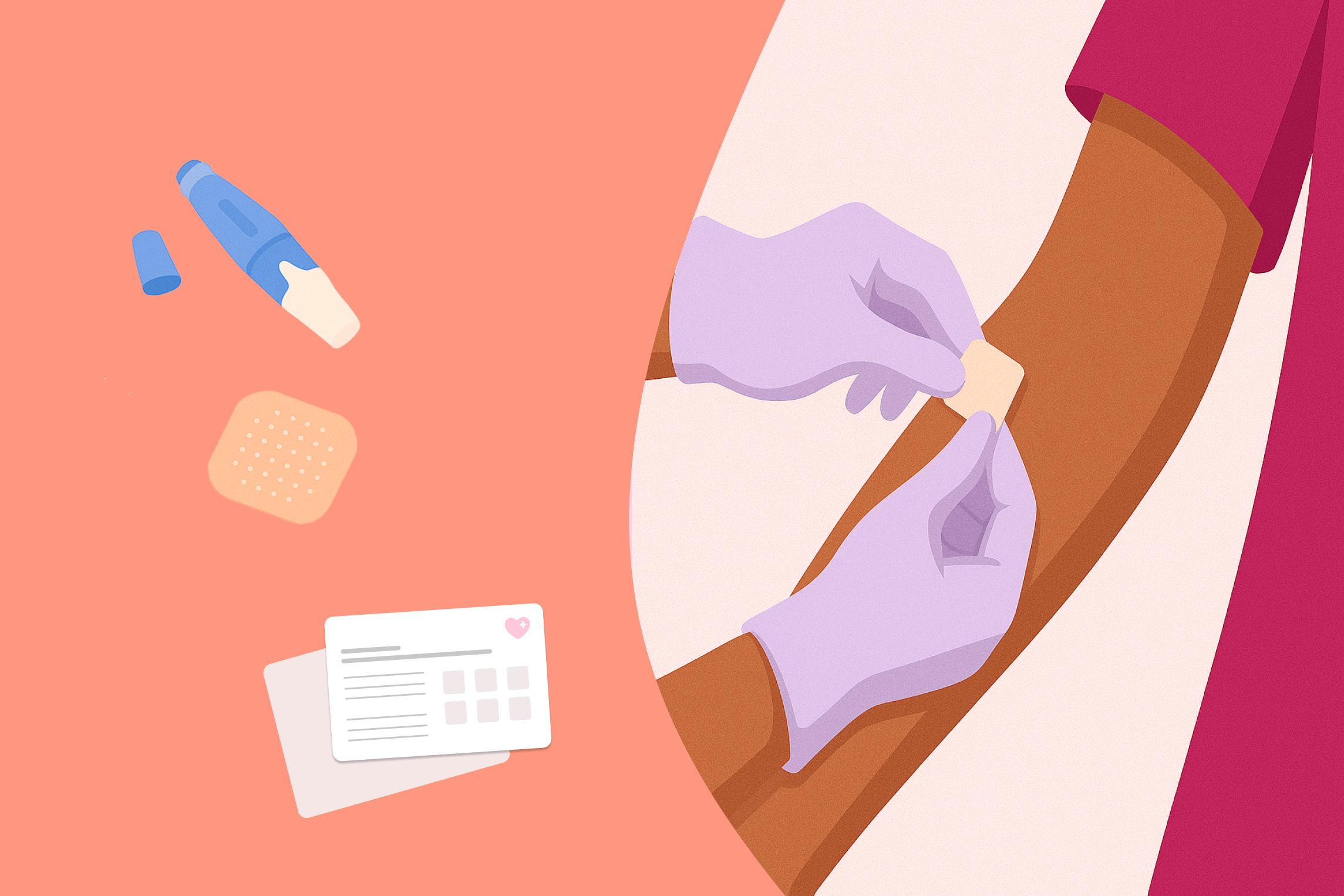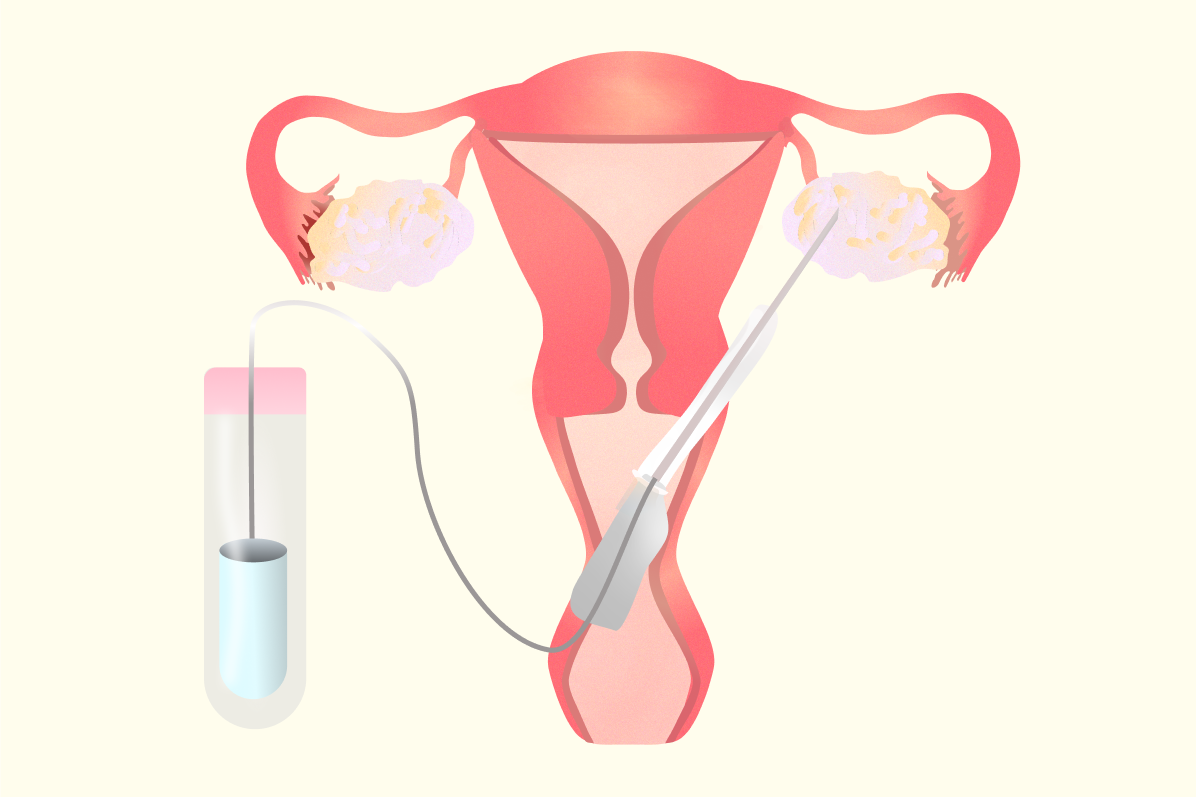Contents
- What is Ozempic?
- How Does Ozempic affect fertility?
- Ozempic and egg freezing
- Should I stop Ozempic during egg freezing?
- When can I start Ozempic after egg freezing?
- I have PCOS, will Ozempic help?
- I have Diabetes, Should I stop Ozempic During Egg Freezing?
- Should I stop Ozempic before getting pregnant?
- Get expert fertility care in the UK, via Amilis
- Frequently asked questions
In an eggshell...
- Ozempic is the brand name for semaglutide, a GLP-1 receptor agonist
- Ozempic has not been studied in infertile women as a fertility treatment
- You will be asked to discontinue Ozempic before starting your egg freezing medication or the stimulation cycle
- If you’re TTC, you’ll be asked to discontinue Ozempic as well
Honestly? The fad with Ozempic isn’t new.
If you’ve been on Reddit- especially the fertility subreddits, you’ll see people pondering Ozempic and fertility.

Some say it helped them, some say it didn't. Most still emphasise it worked best for weight loss over fertility.
While terms such as “Ozempic babies” or how it boosted fertility had its 15 minutes of fame, we’re here to tell you why it might have happened.
We’re also delving into GLP-1 medication, such as Ozempic and its effects on fertility and your egg freezing cycle.
Let’s dive in!
What is Ozempic?
Ozempic is the brand name for semaglutide, a GLP-1 receptor agonist originally developed for managing type 2 diabetes.
It works by mimicking the hormone GLP-1, which helps regulate blood sugar levels and significantly reduces appetite.
It does this by delaying gastric emptying, meaning food stays in your stomach longer, helping you feel fuller for extended periods.
Beyond diabetes management, Ozempic gained widespread attention as people reported remarkable weight loss effects.
But it’s not meant to be taken as an over-the-counter drug or prescribed in cases where it’s not needed, as our medical advisor, Dr Vivienne Hall, puts it:
“This drug is not for everyone. Doctors believe that it is going to be a very important drug globally for people who are obese and need to get their weight in control, but it’s not meant for people of normal weight to want to slim down excessively”
She also says, “There is a risk that if you do use the drug when you are not overweight, you might have nutritional deficiencies”.
Essentially, it’s best taken when prescribed, and for proven reasons.
Does Ozempic Affect Fertility?
Here’s an honesty pill 💊 : The relationship between Ozempic and fertility is complex and still being studied.
There are many women who have reported unexplained pregnancies while taking weight-loss medications like semaglutide, leading to the phenomenon dubbed "Ozempic babies."
However, it's important to understand that Ozempic is not a fertility drug. The increase in pregnancies among users may be attributed to indirect effects of Ozempic, such as weight loss and improvement of insulin resistance, rather than a direct effect.
How Does Ozempic Affect Fertility?
While there are studies on Ozempic and GLP-1 in mouse models, and they show potential metabolic and reproductive benefits- Ozempic has not been studied in infertile women as a fertility treatment.
There's no clinical data available on Ozempic's direct effects on fertility in women trying to conceive, and their safety and efficacy during egg freezing or IVF cycles remain uncertain.
However, the phenomenon of “Ozempic babies” is mainly due to the medication's effects on the body, which can indirectly influence reproductive health. Here’s how:
💊 Ozempic Interferes with Contraceptive Absorption
If you’re on the contraceptive pill and taking Ozempic, it’s important to know that it delays gastric emptying- which in turn affects how your contraceptive pill is absorbed.
“We have reports of many people becoming pregnant while taking Ozempic when they weren't actually trying to conceive in the first place” says Dr Vivienne. “This may be due to the effect of the drug itself, which is to delay gastric emptying, and therefore your contraceptive pill is not absorbed properly and this puts you at the risk of an unwanted pregnancy”
She also emphasises this towards the end- However, this doesn’t mean to say that Ozempic is a fertility drug, and it should never be considered as such.
⚖️ Ozempic leads to Weight Loss
Studies show that Ozempic can lead to significant weight loss due to delayed gastric emptying, keeping you feeling full longer.
This can be especially beneficial for women with PCOS, improving hormonal balance, regular periods, and ovulation rates.
As per research, even losing just 5% of body weight can reduce belly fat, improve insulin sensitivity, and restore normal ovulation. Since extra weight often impacts fertility, Ozempic's weight loss effects could indirectly improve reproductive health.
Freebie alert: Get our free PCOS Guide
🌀 Ozempic Helps with Hormone Regulation and Ovulation
Fat cells can play a role in hormone production by producing excess oestrogen. This imbalance can lead to irregular ovulation.
By promoting weight loss and improving insulin resistance, Ozempic can help reduce excess estrogen produced by fat cells, which may restore the brain-ovary hormonal communication and lead to more regular ovulation cycles.
💉 Ozempic Improves Insulin Sensitivity
When your body responds better to insulin, it improves glucose processing and helps lower androgen levels that interfere with fertility.
Since insulin resistance directly affects ovulation and can lead to infertility, Ozempic's ability to improve insulin sensitivity may help regulate menstrual cycles and boost fertility outcomes, especially for women with PCOS.
Ozempic and Egg Freezing: All You Need to Know
If you're on Ozempic (or planning to) while deciding to freeze your eggs, there are some important considerations to keep in mind:
- You don't need to wait two months after stopping Ozempic before egg freezing (this is recommended for fresh IVF cycles and people wanting to conceive naturally)
- You will be asked to discontinue Ozempic before starting your egg freezing medication or the stimulation cycle
- However, this may vary if you are diabetic and on a GLP-1 medication regimen. Ultimately, your healthcare provider will guide you on the optimal timing.
Always inform your fertility specialist that you're taking Ozempic. With this, they can plan your treatment protocol and ensure your safety throughout the process.
Should I Stop Ozempic During Egg Freezing?
Yes, you should typically stop taking Ozempic during the stimulation phase of egg freezing. This is to ensure your safety during the stimulation and retrieval stage.
Here’s why:
- The egg retrieval (egg collection surgery) requires sedation or anaesthesia
- Anesthesiologists require patients to fast for several hours before sedation
- When you take Ozempic, it delays gastric emptying, meaning food stays in your stomach longer
- This creates a risk of regurgitation during the procedure
When Can I Start Ozempic After Egg Freezing?
You can typically resume Ozempic after your egg retrieval procedure, usually within a few days once you've fully recovered from the sedation and post-retrieval symptoms.
However, the exact timing should always be confirmed with your healthcare provider.
Here’s what to consider:
- Wait until you've fully recovered from anaesthesia
- Ensure you can tolerate regular food and drink
- Make sure your post-retrieval symptoms subside; some may experience bloating, constipation or mild OHSS (ovarian hyperstimulation syndrome)
- Follow your fertility clinic's specific post-procedure guidelines
- Coordinate with both your prescribing physician and fertility specialist on when to resume medication
I Have PCOS, Will Ozempic Help?
The weight loss and insulin sensitivity effects of GLP-1 RAs offer PCOS patients some benefits during their egg freezing or frozen IVF cycles.
However, Ozempic isn't suitable for everyone with PCOS.
Here's a breakdown:
Essentially, Ozempic can work particularly well for PCOS patients who fit the eligibility criteria. It also addresses multiple aspects of the condition: weight management, insulin resistance and ovulatory issues.
I Have Diabetes, Should I Stop Ozempic During Egg Freezing?
If you have diabetes and are taking Ozempic for medical reasons rather than weight loss, the decision to stop during egg freezing requires your healthcare provider’s input.
Here’s what to consider:
🛑 Don't stop Ozempic without consulting both your endocrinologist and fertility specialist. They may need to adjust your diabetes management plan temporarily.
🧑⚕️ Your doctors might recommend switching to pregnancy-safe diabetes medications during the egg freezing process and any future pregnancy attempts.
🏥 Ensure your fertility clinic is aware of your diabetes management needs and can coordinate with your endocrinologist for optimal care.
While stopping Ozempic is necessary during your egg freezing cycle, managing diabetes is equally important. Your doctors will help you find the right balance to protect your current health and optimise cycle outcomes.
Should I Stop Ozempic Before Getting Pregnant?
“There are clear instructions from the manufacturers that you should not be trying to conceive when you’re taking Ozempic, says Dr Vivienne, our medical advisor. “You must stop it two months before you try to conceive. This is because there are reports in mouse studies that there might be birth defects and growth restriction effects on foetuses”.
If you become pregnant naturally while taking Ozempic or other GLP-1 medications, it’s best to contact your doctor immediately.
While there's no need to panic, reaching out for medical guidance is essential.
Your healthcare provider will help you safely stop the medication and discuss alternative approaches for managing blood sugar and weight during pregnancy.
They may recommend other treatment options that are safer for both you and your baby.
Currently, there's limited research on GLP-1 medications during pregnancy, so more studies are needed to fully understand potential risks. Rest assured, your doctor will work with you to create the safest treatment plan for your specific situation.
Get Expert Fertility Care in the UK, via Amilis
The TLDR? The relationship between Ozempic and fertility is not fully understood yet.
This doesn’t mean to say that it should be avoided- rather it’s best taken with proper guidance, and care.
And at Amilis, we prioritise exactly that.
Regardless of where you are in your fertility journey, you get expert care, guidance and support.
Whether you’re considering egg freezing, IVF or even at the start line of exploring your fertility, we’ve got you covered.
When you opt for fertility testing via Amilis, here’s what you get:
- Zero waiting times, and the option to book a fertility test anytime, at your convenience (via Randox and accredited labs across the UK- aka, they get accepted by most fertility clinics)
- An AMH test at just £80 and a full hormone panel at just £130 (50% cheaper than fertility clinics)
- A personalised report on your hormone levels and what your hormone levels could mean for your fertility
- Book a free consultation with expert doctors, and with the best fertility clinics across the UK
Our approach combines the convenience you need with the clinical validity you deserve.
Figuring out where to get started? Book a doctor consultation, or take our personalised fertility quiz to know more!
We’re making healthcare accessible and affordable in the UK, one day at a time 💪🏻
Frequently Asked Questions
Does Ozempic Make You Fertile?
Ozempic is not a fertility drug and should never be considered as such. While some women report increased pregnancies while taking the medication, this is likely due to weight loss improving overall reproductive health or affected contraceptive absorption, rather than the drug directly enhancing fertility.
Does Saxenda Affect Fertility?
Like Ozempic, Saxenda (liraglutide) is a GLP-1 receptor agonist. Similar principles apply: it may indirectly improve fertility through weight loss and metabolic improvements, but it's not a fertility treatment and should be stopped before attempting conception.
Does Wegovy Affect Fertility?
Wegovy (semaglutide) is essentially the same medication as Ozempic but specifically approved for weight management. The same fertility considerations apply to both medications.
What other medications are similar to Ozempic?
Ozempic belongs to a class of medications called GLP-1 receptor agonists, which help regulate blood sugar and appetite. Other medications in this class include:
- Wegovy (semaglutide) - Same active ingredient as Ozempic, but FDA-approved for weight loss
- Mounjaro/Zepbound (tirzepatide) - Dual-action medication approved for diabetes (Mounjaro) and weight loss (Zepbound)
- Trulicity (dulaglutide) - Weekly injection for type 2 diabetes
- Victoza/Saxenda (liraglutide) - Available for diabetes (Victoza) and weight loss (Saxenda)
- Bydureon (exenatide) - Weekly injection, older medication in this class
All of these work similarly by mimicking natural hormones that control blood sugar and appetite, though they may have different dosing schedules and approved uses.



.png)






